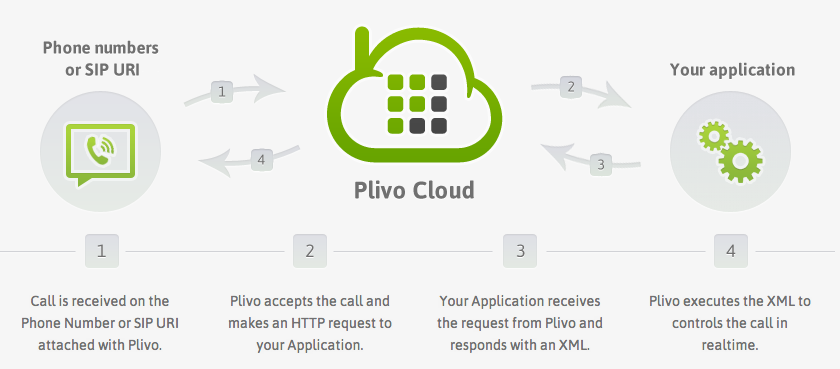Plivo, a telephony startup from the current Y Combinator batch, is today launching its API platform for voice and SMS applications. Despite the sound of it, Plivo is not a direct competitor with developer-friendly Twilio, but is targeting larger businesses in need of scale.
The company’s founders, Venkatesh B and Michael Ricordeau (who go by Venky and Mike), met over GitHub two years ago, while each were working on their own telephony applications. Venky has seven years of telecom experience and Mike has ten, so they’re both deeply familiar with both the challenges and the opportunities of working in this space. In an effort to “scratch their own itch,” as they say, the two began collaborating on what would become Plivo.
“Being from telephony, we always understood this space is not about buying minutes from carriers, marking it up and reselling that,” says Venky. “You can do that for the long-tail market, but for serious businesses, that doesn’t really work,” he says. “We allow businesses to offload their telephony infrastructure to us and scale that at whatever scale they want us to.”
The company’s real competition comes from software built back in 1999 called Asterisk, which is what most larger scale business use to create their voice and SMS API platforms today. Plivo, however, is built using FreeSWITCH, a newer, open source alternative to Asterisk. FreeSWITCH doesn’t offer as much documentation and requires a deeper understanding of telephony, which is why businesses today still turn to Asterisk, even though it’s not the better technology. And that’s where the opportunity for Plivo comes in. Thanks to the founders’ backgrounds, they’ve made FreeSWITCH available as an API platform.
Unlike Twilio, which runs on Amazon’s cloud, Plivo runs on dedicated servers. “We know that when you run things like that on Amazon’s cloud, the voice qualities degrades, and you cannot guarantee quality of service to customers,” explains Venky.
The company offers two levels of service. The first allows you to use Plivo’s own carriers on a contract-free, pay-as-you-go basis, which includes volume rates from the start as a competitive advantage. The other is designed for larger businesses which already have carrier relationships and are just in need of a platform to build upon. For these customers, pricing is a fixed 0.4 cents.
Launched six months ago in invite-only mode, Plivo now has a dozen customers, half of which are paying. From those paying customers, it now handles 4 million minutes per month on its platform. One of its customers switched from another provider and is now saving 60% in costs, says Venky.
Today, Plivo is exiting its invite-only status and making its platform available to all. For those wanting to use Plivo’s carriers, it’s available in the U.S. and Canada for now. For businesses with their own carrier relationships, Plivo can be used worldwide. In addition to YC backing, Plivo has a small amount of seed funding ($250K) from an Indian accelerator, Morpheus. The company is currently a team of seven engineers in both India and the U.S., and is hiring engineers, sales and marketing staff. Businesses interested in trying out Plivo themselves can sign up here.

